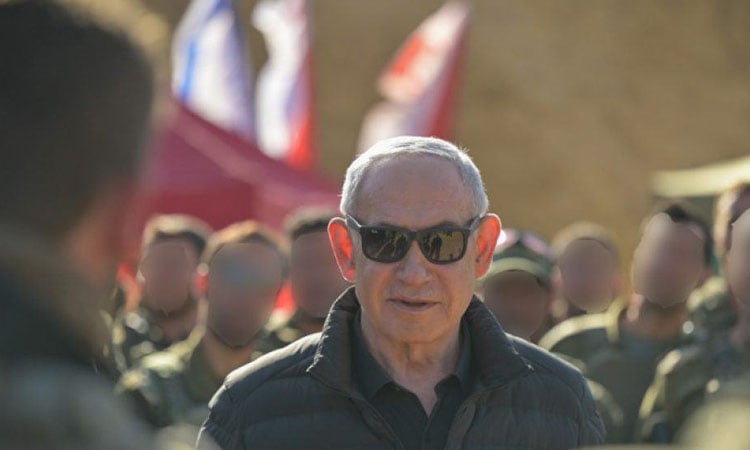News Flash
News Flash

JERUSALEM, Nov 20, 2025 (BSS/AFP) - Prime Minister Benjamin Netanyahu on Wednesday visited Israeli troops deployed in a buffer zone inside Syria, calling their presence immensely important to their country's security while drawing a sharp rebuke from Damascus and others in the region.
When Syrian president Bashar al-Assad was ousted from power in December last year, Israel swiftly sent troops into the UN-patrolled buffer zone, which has separated Israeli and Syrian forces on the Golan Heights since 1974.
Netanyahu visited a military outpost inside the zone in a trip deemed "concerning" by UN chief Antonio Guterres, and condemned by Turkey, Iran, Jordan and Algeria, among others.
"We attach immense importance to our capability here -- both defensive and offensive," Netanyahu told troops in a video of the visit released by his office.
He said they were "safeguarding the State of Israel and its northern border".
"This is a mission that can develop at any moment, but we are counting on you," he added.
Syria condemned "in the strongest terms the illegal visit... considering it a serious violation of Syria's sovereignty and territorial integrity", its foreign ministry said, demanding Israel's immediate withdrawal and maintaining the visit violated Security Council resolutions.
Netanyahu was accompanied by Defence Minister Israel Katz and Foreign Minister Gideon Saar, as well as military chief Eyal Zamir, the Shin Bet security agency director David Zini, and Israel's ambassador to the United States Yechiel Leiter.
- 'Concerning to say the least' -
Video footage released by the Israeli government showed Netanyahu stepping out from the back of a helicopter, talking to troops in an observation post and looking through a pair of binoculars.
The buffer zone is more than 80 kilometres (50 miles) long and less than 10 kilometres across at its widest point.
Netanyahu, Katz, and military and security chiefs first visited the strategic area on December 17 last year, shortly after it was seized by Israeli troops.
At the United Nations in New York, Guterres's spokesman Stephane Dujarric said the "very public visit is concerning to say the least".
"We call on Israel to respect the 1974 disengagement agreement," he said.
In a resolution passed on November 6, the UN Security Council reaffirmed its strong backing for Syria's sovereignty, independence, territorial integrity and national unity.
However, "Israeli military operations and incursions into Syrian territory continue, in grave violation of Syria's sovereignty and of international law", UN deputy special envoy for Syria Najat Rochdi told the council on Wednesday.
"They endanger civilians, inflame regional tensions, undermine the fragile security environment, and threaten the political transition."
Turkey's representative at the UN said that for the sake of regional stability, Israel "must reconsider policies that aim to keep Syria weak and fragmented".
Iran's ambassador said Israel was "dangerously heightening regional tensions", while Algeria was "deeply alarmed" by Netanyahu's visit, its ambassador said.
Meanwhile, Jordan's foreign ministry slammed Netanyahu's visit as "provocative, dangerous, and unacceptable".
- Sharaa's US trip -
Netanyahu's visit came the week after Syria's President Ahmed al-Sharaa -- once a jihadist detained in Iraq by US forces -- met American President Donald Trump at the White House for unprecedented talks.
Washington -- Israel's key ally -- has been pushing for a security pact to end decades of enmity between Syria and Israel, part of Trump's goal to shore up the fragile Gaza ceasefire with a broader Middle East peace settlement.
While Syrian and Israeli officials have held repeated rounds of talks, Sharaa has ruled out Syria joining the Abraham Accords, under which a handful of Arab countries have normalised ties with Israel.
Sharaa told Fox News last week that the ongoing dispute over the Golan Heights would make entering peace talks difficult.
But he suggested talks facilitated by Washington could help start improving relations.
Israel captured the Golan Heights, a strategic mountain plateau, from Syria during the 1967 Arab-Israeli war and later annexed it, in a move not recognised by most of the international community.